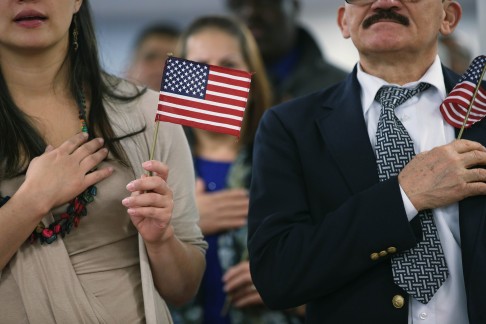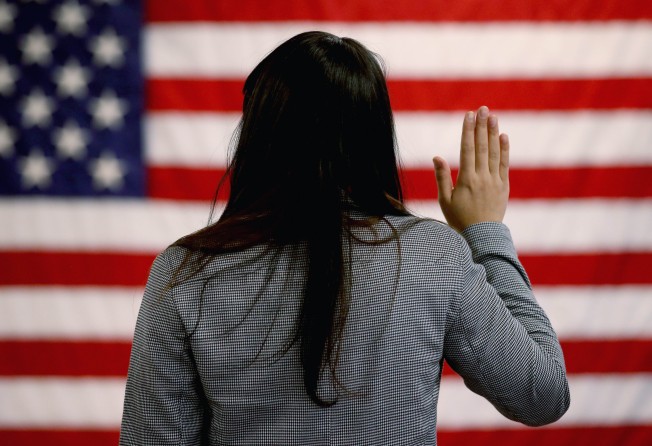
More renounce US citizenship but deny stereotype

Inside the long-awaited package, six pages of government paperwork dryly affirmed Carol Tapanila’s anxious request. But when Tapanila slipped the contents from the brown envelope, she saw there was something more.
Her US passport now had four holes punched through it from cover to cover. Her departure from life as an American was stamped final on the same page: “Bearer Expatriated Self.”
With the envelope’s arrival, Tapanila, who has lived in Canada since 1969, joined a largely overlooked surge of Americans rejecting what is, to millions, a highly sought prize: US citizenship. Last year, the US government reported a record 2,999 people renounced citizenship or terminated permanent residency; most are widely assumed to be driven by a desire to avoid paying taxes on hidden wealth.
The reality, though, is more complicated. The government’s pursuit of tax evaders among Americans living abroad is indeed driving the jump in abandoned citizenship, experts say. But renouncers — whose ranks have swelled more than five-fold from a decade ago — often contradict the stereotype of the financial scoundrel. Many are from very ordinary economic circumstances.
Some call themselves “accidental Americans,” who recall little of life in the US, but long ago happened to be born in it. Others say they renounced because of politics, family or personal identity. Some say signing away citizenship was a huge relief. Others recall being sickened by the decision.
At the US consulate in Geneva, “I talked to a man who explained to me that I could never, ever get my nationality back,” says Donna-Lane Nelson, who has lived in Switzerland 24 years. “It felt like a divorce. It felt like a death. I took the second oath, and I left the consulate and I threw up.”
One of the few times rejected US citizenship has gotten significant attention was Facebook co-founder Eduardo Saverin’s 2011 decision to turn in his American passport after moving to Singapore. Saverin likely avoided millions of dollars in taxes by doing so shortly before Facebook’s initial stock offering.
Other wealthy Americans have relinquished US citizenship. Denise Rich, the ex-wife of pardoned trader Marc Rich, expatriated in 2012 and lives in London. Last fall, singer Tina Turner, a resident of Switzerland since 1995, relinquished her US passport.

Decisions to renounce “are driven by a whole range of emotional considerations. ... You’ve got anger, you’ve got fear, you’ve got a strong sense of indignation,” said John Richardson, a Toronto lawyer who advises people on expatriation. “For many of these people, this is not a tax issue at all.”
Corine Mauch was born a US citizen to Swiss parents who were college students in Iowa. They lived in the US until she was 5, then again for two more years before she turned 11. Mauch maintained dual citizenship even after she was elected to Zurich’s city council. But when she became mayor, she reconsidered.
During the last American presidential election, “I asked myself ‘Where do I feel at home?’ And the answer is clear: In Zurich and in Switzerland. My attachment to America is limited to my very early youth,” Mauch said.
Norman Heinrichs-Gale’s parents were missionaries from Washington state who raised him in Asia and the Middle East. In 1986, he traveled to Austria with his American wife, and they found work at a conference centre.
On yearly trips to the US, he felt increasingly like a stranger. “I never forget going into a grocery store and just being stunned by my choice of cereals,” Heinrichs-Gale says. “I was stunned by just the pace of life compared to what we have here, stunned by the extremes of wealth and poverty that I encountered.”
Sports played the central role in Quincy Davis III’s decision. Davis, raised in Los Angeles and Alabama, played professional basketball in Europe. By 2011, he was home studying to become a firefighter when he was offered a spot on a Taiwanese pro squad. He’s since helped lead the Pure Youth Construction team to two championships.
When the team’s owner suggested last year that he join Taiwan’s national team, Davis says he found little motivation to keep his US citizenship.
“When you think about who I am as a black guy in the US, I didn’t have opportunities,” he says. “You get discriminated against over there in the South. Here everyone is so nice. They invite you into their homes, they’re so hospitable. ... There’s no crime, no guns. I can’t help but love this place.”
The jump in renunciations reflects evolving views about national identity, said Nancy L. Green, an American professor at the L’Ecole des Hautes Etudes en Sciences Sociales in Paris. When the US got its start, citizenship was defined by “perpetual allegiance” — the British notion of nationality as a birthright that could never be changed.
American colonists rejected that to justify becoming citizens of a newly independent country. But changeable citizenship wasn’t widely embraced until the mass immigration of the late 1800s, says Green, a historian of migration and expatriation.
Even then, US artists and writers who moved to Europe in the 1920s were criticized, suspected of trying to avoid taxes. Until the 1960s, US citizenship remained a privilege the government could take away on certain grounds. It’s only since then that US citizenship has come to be viewed as belonging to an individual, who could keep — or surrender it — by choice.